Goodreads Authors/Readers discussion

This topic is about
Queer Poems
Poetry
>
Queer Poems
 Hi Billy,
Hi Billy, I'm thinking about it... Queer Poems won't be published by the same publishers as Ybo' so, a few things to check there. And I would like it to be all new poems... Where do you get the 135,000 readers?
 Ok... I think it's the word 'erotic' in the title of the page that attracts people. I admit it was one of the first gay erotic poems ever to make it on the net. I suspect the count is over the years, I don't know though.
Ok... I think it's the word 'erotic' in the title of the page that attracts people. I admit it was one of the first gay erotic poems ever to make it on the net. I suspect the count is over the years, I don't know though.Thinking still...
 On reflection, I don't think I'll include 'Between Dreams'. I think I want to stick to all new material. Besides, 'Between Dreams' is fully in iambic pentameters, and that doesn't suit the struggle between rhyme, rhythm and meaning that Queer Poems explores. But I'll stick it beneath, as it is very dear to me:
On reflection, I don't think I'll include 'Between Dreams'. I think I want to stick to all new material. Besides, 'Between Dreams' is fully in iambic pentameters, and that doesn't suit the struggle between rhyme, rhythm and meaning that Queer Poems explores. But I'll stick it beneath, as it is very dear to me: 
 I can see your development as a poet, from hermetic to a balance between extremely intense imagery, allusive form and more accessible expression.
I can see your development as a poet, from hermetic to a balance between extremely intense imagery, allusive form and more accessible expression. I'm talking about the peak of your 'incompreshensibility' here, the series Heav'n from Hell; I think you peaked there as one of the most complex poets I have ever read, experimenting to the extreme, and then drew paths out of it and explored them separately and in a much more accessible way. I am old, and if I may, maturity only comes through the relations we had with others: I think you have reached this stage.
'Shadow Whisper' is quite an achievement: you manage an awful lot in these few lines, in terms of meaning, effect and style. I love the breaking of the rhythm/rhyme/alliteration pattern, and the resolution in the final two lines.
I have just looked at the painting 'Shadow Whisper'; I had not met the painter before... That is an incredibly beautiful and intense painting.
 In exclusive for The Cult of Me, 'Dusty Grins' from Queer Poems, a poem dedicated to the homeless, is available, thanks to Michael Brookes, here>>
In exclusive for The Cult of Me, 'Dusty Grins' from Queer Poems, a poem dedicated to the homeless, is available, thanks to Michael Brookes, here>>
 Sam wrote: "I can see your development as a poet, from hermetic to a balance between extremely intense imagery, allusive form and more accessible expression.
Sam wrote: "I can see your development as a poet, from hermetic to a balance between extremely intense imagery, allusive form and more accessible expression. I'm talking about the peak of your 'incompreshens..."
Hello Sam,
Sorry for the late reply. Thanks. I don't know how 'mature' I am, but I think you hit the nail on the head talking about how people, in maturing, turn 'inside out', by which I mean that we have a long phase, adolescent, which is strongly egocentric, as we are discovering ourselves and who we are and we are becoming; later in life, one's focus shifts to the world around us and other people. At least it was like that for me. I'd agree that Ybo' was about the world within me, while Queer Poems is about the world as I see it, and The Road to London might be about how a boy with a 'difference' struggles between discovering himself and coming to terms with others and the world, that process of 'carving your space' in the world has been fascinating me for long, I also do see how that has provoked a shift in my style from inaccessible to accessible.
 I've just come across this article on 'Shadow Whisper', giving a feminist reading of the poem. I think it does capture the essence of the aesthetics I am pursuing in Queer Poems:
I've just come across this article on 'Shadow Whisper', giving a feminist reading of the poem. I think it does capture the essence of the aesthetics I am pursuing in Queer Poems:Article on 'Shadow Whisper'>>
Ahead of the publication of Queer Poems, there will be a live event, where some of the poems will be 'brought to life'; if you are in London and free, keep it in mind...
Dreams of London
Night dreams, day dreams, the dreams we keep locked in drawers, nightmares and saucy (but not wet) dreams are a major theme in my work as a novelist and poet, and I will explore this theme in Dreams of London , a live performance with passages from The Road to London, Queer Poems and Ybo' and Other Lies.
For those who have already seen me live, maybe at the Sussex Guild of Poetry, University of Sussex annual recital, there is no need to warn you not to expect a stiff reading behind a ledger... If there is something I have learnt from teaching for so many years is that Literature can be fun... A lot of!
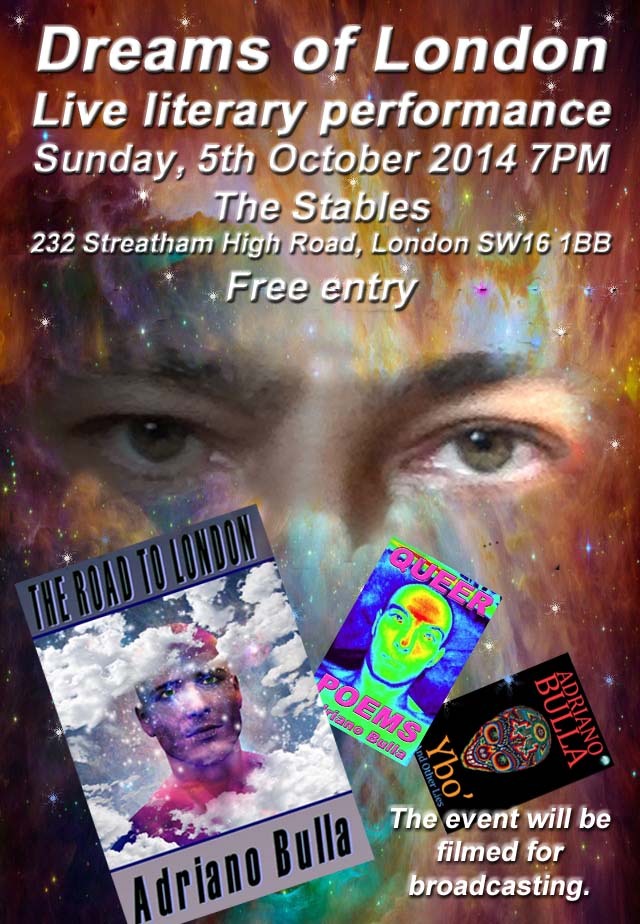
 I hadn't written a poem in Italian since I was eleven, and, in a way, in the back of my mind, I had the idea of writing one in Dantesque for some time... Suddenly, it came: it's in terza rima, and in this it differs from the others, but it talks about a 'bent love' ('amore storto') and using a very literary voice, gives gravitas to the poem. It's a bit the centrepiece of Queer Poems and it's entitled 'La Rima 'l Cor' ('The Rhyme to the Heart'):
I hadn't written a poem in Italian since I was eleven, and, in a way, in the back of my mind, I had the idea of writing one in Dantesque for some time... Suddenly, it came: it's in terza rima, and in this it differs from the others, but it talks about a 'bent love' ('amore storto') and using a very literary voice, gives gravitas to the poem. It's a bit the centrepiece of Queer Poems and it's entitled 'La Rima 'l Cor' ('The Rhyme to the Heart'):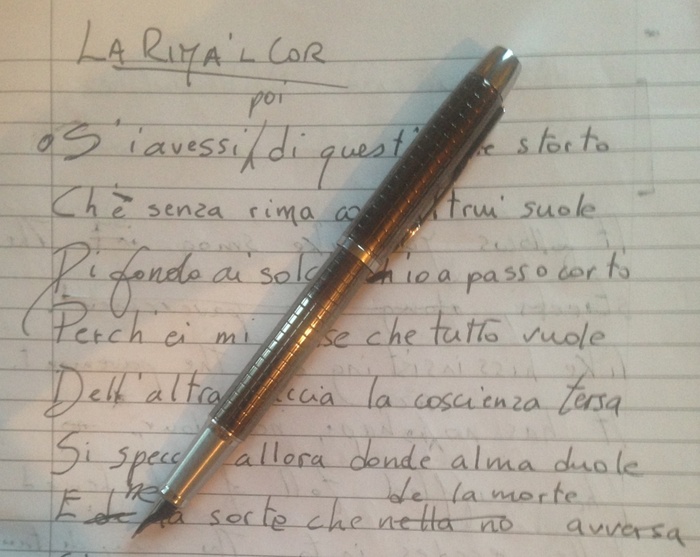
 Queer Poems should be ready pretty soon; if anybody who loves poetry is interested in a free copy in exchange for an honest review, just private message me.
Queer Poems should be ready pretty soon; if anybody who loves poetry is interested in a free copy in exchange for an honest review, just private message me.
 Gay wrote: "Adriano wrote: "Queer Poems should be ready pretty soon; if anybody who loves poetry is interested in a free copy in exchange for an honest review, just private message me."
Gay wrote: "Adriano wrote: "Queer Poems should be ready pretty soon; if anybody who loves poetry is interested in a free copy in exchange for an honest review, just private message me."I love poetry and I'm ..."
Thanks, no worries, just send me a private message with your email and I'll send you a copy; if you want a paperback you'll have to wait till November, as it's not being printed yet.
Alliteration... There may be a few reasons: originally, English poetry had no rhyme, rhyme came from the French Troubadour tradition into English poetry in the Middle Ages, before that, alliteration was fundamental in every line; John Milton calls rhyme 'the invention of a barbarous age,' and find it 'no necessary adjunct' to poetry; on the other hand, English lends itself to more sophisticated forms of rhyme than French itself, feminine rhymes, for example, can be created quite easily and meaningfully in English, one can just remember Yeats, William Butler' 'Paysage Moralise'' as an example; I used lots of alliteration when I started out as a poet many years ago, and played with its effect a lot, so, I still feel that I want to keep reminding myself of how I started on this journey; I also am a bit of a believer that the very main quality of poetry is sound, thus, alliteration, which creates an atmosphere through the sounds of consonants, creating feelings, giving impressions without pinpointing what the feeling shoul be, still remains, in my opinion, a powerful expressive tool in poetry.
 Yesterday, I watched a documentary on the Ulas siblings and I was touched; I was also disturbed by how some of the scientists involved treated them as 'laboratory specimens' and by how they were so much taken by their 'chance to make a great scientific discovery' that some went on and on trying to find the scientific causes of these people's condition and paid so little thought to trying to help them: kudos to the physiotherapist who thought how a cheap Zimmer frame could change their lives dramatically, after others investing who knows how much on DNA tests etc.
Yesterday, I watched a documentary on the Ulas siblings and I was touched; I was also disturbed by how some of the scientists involved treated them as 'laboratory specimens' and by how they were so much taken by their 'chance to make a great scientific discovery' that some went on and on trying to find the scientific causes of these people's condition and paid so little thought to trying to help them: kudos to the physiotherapist who thought how a cheap Zimmer frame could change their lives dramatically, after others investing who knows how much on DNA tests etc.From the manuscript of 'For You Too' (pun intended) in Queer Poems, written for the Ulas siblings:

 All the poems have are writ; here are the titles and, in brackets, their themes:
All the poems have are writ; here are the titles and, in brackets, their themes:'Shadow Whisper' (domestic violence)
'Born in Between' (androgyny)
'Lament to Lust' (the beauty of gay love and its prosecution)
'Lucasz Wodynski, Exzistences, Oil on Canvas 2011' (old age and ageism)
'Dust' (depression)
'Twilight Life' (bisexuality)
'Dusty Grins' (homelessness)
'Reflection Past' (queer history)
'Woman Within' (transphobia)
'Into the Distance' (still birth)
'Armoured Hearts' (drag queens)
'For a Moment' (still birth)
'La Rima 'l Cor' (coming out)
'Never Mind' (intellectual cowardice)
'Still Voices' (prejudice)
'Morbid Minds' (morbid curiosity about other people's sexuality and sexual activities)
'The Drip of Copper' (poverty)
'Deserted Dreams' (poverty and hunger)
'Forbidden Bloom' (physical disability)
'For You Too' (quadrupeds- physical appearance)
'In the Shadow' (those whom the rat race leaves behind)
'Cracking Mirror' (transphobia)
'The Strings' (society)
'In the Mirror' (transphobia)
'Between the Drops' (water, and those who can't afford it)
'In Fear of Self' (homophobia)
'Ode to the Aubergine' (vegetables)
 Queer Poems is finished and sent to print...
Queer Poems is finished and sent to print...It's out on pre-order on Amazon for £0.77 or $1.00 till the 27 November; ok one doesn't write poetry to become rich.... Still if anyone who loves and understands poetry fancies writing an honest review, just drop me a message with your email.
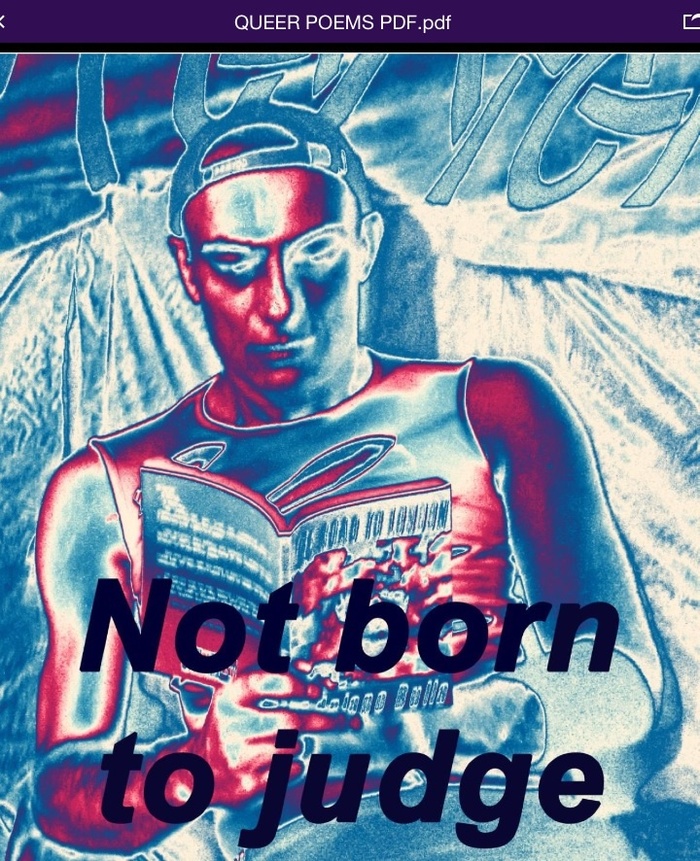
 Many thanks and hugs to Vanessa Vanney Thompson for her lovely review of Queer Poems which you can read
here>>
Many thanks and hugs to Vanessa Vanney Thompson for her lovely review of Queer Poems which you can read
here>>
 Queer Poems is now available in paperback on Amazon >>.
Queer Poems is now available in paperback on Amazon >>.This is the cover of the paperback edition (the Amazon page will show the correct cover in a matter of days):
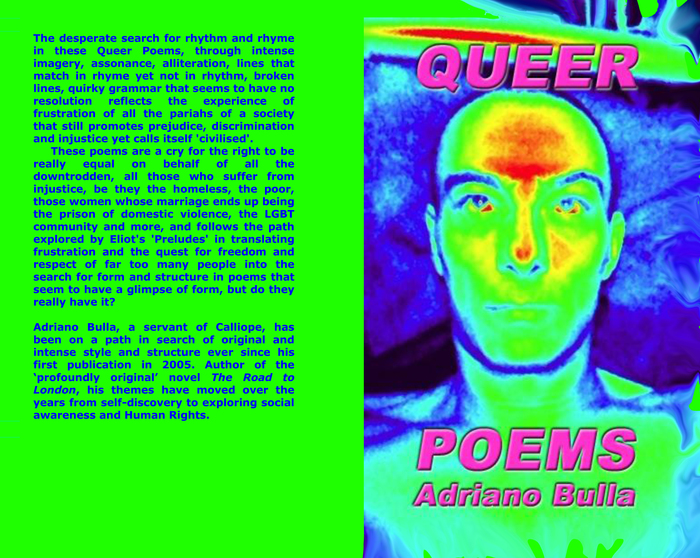
The paperback edition retails at £2.75, $5.39 and €3.30.
 Hello,
Hello,I'm a bit technically challenged, but thanks to the great support I received from Gisela Hausmann, I managed to open my own a Literature Blog: there are eight posts on it as it stands, some on Literary Theory, some on Poetry. Here's one, The Sound of Poetry >> , which discusses free verse and my general ideas on the nature of poetry.
 Lara Heacock, who runs
Kind over Matter >>
, an organisation dedicated to promoting fairness and equality and improving life via kindness and respect, contacted me after having read the 'pre-released' poems, 'Shadow Whisper' and 'Dusty Grins' from Queer Poems, wanted to read the book, and she offered to feature one of the poems every last Sunday of each month for a year on the Kind over Matter website, calling the little poems 'awesome'.
Lara Heacock, who runs
Kind over Matter >>
, an organisation dedicated to promoting fairness and equality and improving life via kindness and respect, contacted me after having read the 'pre-released' poems, 'Shadow Whisper' and 'Dusty Grins' from Queer Poems, wanted to read the book, and she offered to feature one of the poems every last Sunday of each month for a year on the Kind over Matter website, calling the little poems 'awesome'.The first of the ones she has chosen is the 'lead poem' and one of my favourites: 'Shadow Whisper'. Right... I know, this poem is a bit everywhere, and there's even an article on it, but I think it's a good piece to start both the book and the series of features. Why? Well, why did I choose the word 'queer'? I did it because I find the word inclusive and empowering, as while you can't choose to be old or LGBT etc, you can choose to call yourself 'queer': it's a welcoming and open group. Including a poem on domestic violence in the collection I think makes the point that not 'fitting in' is not necessarily a genetic matter, but can be brought about by many situations, and that, I believe, most of us have felt 'queer' at some time in our lives. Besides, domestic violence is the most claustrophobic predicament, which inspired the image of the curtain drawn on the pain of the victim.
I don't know which poem Lara will choose next, so, it will be a surprise....
Ad I suppose I won't have reasons to post here before Christmas, I'll just wish everybody a happy (and queer if you will) Christmas.
Ade
 Adriano wrote: "Hello,
Adriano wrote: "Hello,I'm a bit technically challenged, but thanks to the great support I received from Gisela Hausmann, I managed to open my own a Literature Blog: there are eight posts on it a..."
THX for the flowers @Adriano. I see it more as 'sharing the shortcuts I have found' because I am a bit technically challenged myself. YOur blog is beautiful
 Gisela wrote: "Adriano wrote: "Hello,
Gisela wrote: "Adriano wrote: "Hello,I'm a bit technically challenged, but thanks to the great support I received from Gisela Hausmann, I managed to open my own a Literature Blog: there are eig..."
Thanks, Gisela!
For those who don't know, Gisela taught me how to 'run a blog'; without her, I would have no Literature Blog at all.
Ade
 Just a reminder... This Sunday, 18th January, Kind over Matter, will feature another of the Queer Poems; I don't know which one myself, but I'll post the link...
Just a reminder... This Sunday, 18th January, Kind over Matter, will feature another of the Queer Poems; I don't know which one myself, but I'll post the link... On Tuesday 20th, I'll be 'reading' live in a secret venue in Central London... Ah, I won't say where... But... We'll make a video of it (the camera broke down during my last performance, 'Dreams of London'... still, lovely people in the audience sent me some pictures they took with their cameras, thanks!)

 Androgyny... When I was younger, I was pretty androgynous, with long hair and, for a couple of years, wearing lots of necklaces, bangles, lace, headbands etc, I did attract 'interesting' comments and looks.
Androgyny... When I was younger, I was pretty androgynous, with long hair and, for a couple of years, wearing lots of necklaces, bangles, lace, headbands etc, I did attract 'interesting' comments and looks. 'Born in Between' from Queer Poems, this month's featured poem from Queer Poems in Kind Over Matter, is about it. Of course, the rewards coming from the experience of being androgynous to the heart and mind are, I believe, huge: because you can't physically identify your features as being female or male when looking in the mirror, I suspect you grow an awareness that not everybody feels that they belong to this or that category, that they fit in this or that box... Unfortunately, it also attracts that form of curiosity that wants to judge, which is part of what these poems are trying to argue against. As one of the first 'descriptors' we use when we see someone is their sex, androgyny tends to get 'curious stares' very quickly; while some great stars, for example Marlene Dietrich and Grace Jones, have used their androgynous faces to their advantage, it does get tiring to know that every time you show yourself in public many people wonder whether you are a woman or a man, as if it mattered. Yet, I suppose it lifts the lid on many forms of prejudice, in particular sexism: why do we feel the need to know if someone is a woman or a man? Will we act differently accordingly?
There are a couple of oxymora ('known uncertainty' and 'still secluded storms') in the poem, which I found appropriate for the ways both the androgynous feels and the 'judger' thinks, as these peemettes tend to present two contrasting points of view with the same words.
'Born in Between' >>
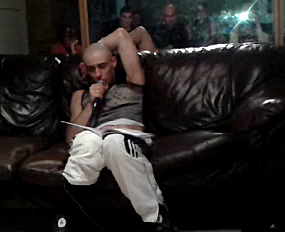
 "it does get tiring to know that... people wonder whether you are a woman or a man, as if it mattered. ...why do we feel the need to know if someone is a woman or a man?" -- Of course it matters -- how else can a single, unattached person know whether you are a potential match or not?
"it does get tiring to know that... people wonder whether you are a woman or a man, as if it mattered. ...why do we feel the need to know if someone is a woman or a man?" -- Of course it matters -- how else can a single, unattached person know whether you are a potential match or not?
 Dennis wrote: ""it does get tiring to know that... people wonder whether you are a woman or a man, as if it mattered. ...why do we feel the need to know if someone is a woman or a man?" -- Of course it matters --..."
Dennis wrote: ""it does get tiring to know that... people wonder whether you are a woman or a man, as if it mattered. ...why do we feel the need to know if someone is a woman or a man?" -- Of course it matters --..."Thanks for your comment, Dennis.
Queer Poems, like my other work, is not about sex, but identity and sexuality.
To your unattached friend, I'd say that people are not just available as possible sexual matches, but as friends, colleagues etc, and, although I have not been particularly lucky in finding partners myself, maybe, just maybe, sexual relationships that come after having known a person for some time, perhaps as a friend first, have a better chance of being meaningful and lasting than if those born out of a quick decision on whether someone is sexually compatible or not. I've usually found that if I am looking for a partner, I won't find one, while when I let Fate drive my life, lots of beautiful things happen.
 Of course it is important to know the person for some time (as opposed to having a one-night stand), but you're missing the point -- what I'm trying to say is, when looking for love, the other person's gender is FUNDAMENTALLY important above ALL else! In other words, it is THE first thing to look at when looking for a partner: if the other person is of the right gender, then you try to get to know that person better and see if you make a good match, whereas if the other person is of the wrong gender, you don't even go there and keep it to "just friends" -- do you understand what I'm saying here?
Of course it is important to know the person for some time (as opposed to having a one-night stand), but you're missing the point -- what I'm trying to say is, when looking for love, the other person's gender is FUNDAMENTALLY important above ALL else! In other words, it is THE first thing to look at when looking for a partner: if the other person is of the right gender, then you try to get to know that person better and see if you make a good match, whereas if the other person is of the wrong gender, you don't even go there and keep it to "just friends" -- do you understand what I'm saying here?
 Dennis wrote: "Of course it is important to know the person for some time (as opposed to having a one-night stand), but you're missing the point -- what I'm trying to say is, when looking for love, the other pers..."
Dennis wrote: "Of course it is important to know the person for some time (as opposed to having a one-night stand), but you're missing the point -- what I'm trying to say is, when looking for love, the other pers..."Of course I understand what you are saying, but as I said, Queer Poems are not romantic poems, or love poems in that respect.
As you say 'when looking for love'; well, then, the knowledge of wherher someone is a woman, a man, straight, gay, bisexual or totally not interested in sex can wait till a relationship is on the cards. Instead, if you are androgynous, you will find that that is the first question lots of people ask themselves about you. If people are not looking for romantic love every time they see a person, why is it that the fact that one is a woman or a man is so important to them on seeing (let alone meeting and getting to know) a new person?
Queer Poems is not 'set', to borrow a term from narrative, in a speed-dating club, but in society and societal perceptions.
I did point out that androgyny gets curious stares very quickly in my post, quite recently, in a supermarket I heard and saw giggles as well, and the targeted person was very 'uneasy' about it.
As a footnote, the sex of a person may be fundamentally important to some people when looking for a partner, it is not the case for everybody though, a simple example is bisexual people, often polyamorous relatiomships include people of different sexes, lots of straight people have the odd afgair with people of the same sex and I do know quite a few cases (and very important in my life) of people who have changed sexuality for love...
As an extra footnote, sex is not gender. Sex is anatomical, gender psychological, I can say with some onfidence that my gender, for example, slides on a glide beyween masculine and feminine quite easily.
 "Changed sexuality for love"? WTH does that mean? If 2 straight people are of the same sex, there can be no romantic love between them in the first place!
"Changed sexuality for love"? WTH does that mean? If 2 straight people are of the same sex, there can be no romantic love between them in the first place!
 Dennis wrote: ""Changed sexuality for love"? WTH does that mean? If 2 straight people are of the same sex, there can be no romantic love between them in the first place!"
Dennis wrote: ""Changed sexuality for love"? WTH does that mean? If 2 straight people are of the same sex, there can be no romantic love between them in the first place!"My experience, and that of quite a few people I know, tells me that not all stories are like Person A meets Person B (who are already sexually compatible), they fall in love and later may fall out of love or not...
One should look at the first word of the title of the book, 'queer', and it may be easier to grasp that these poems are not about the majority, the more common pattern in life, or the 'dominant', in, I apologise, a Marxist sense, sector of society. On the contrary, they stand for the rights of people who, as I say in the top post and in the preface to the collection, 'don't conform'. What we often unfortunately find is that some people are not willing to accept realities or choices that do not fit in with their ideas. In the specific case of 'Born in Between', one could read it as a poem about how some people are judged by their looks, and take androgyny as an example. I have so far avoided to point out that, again, I have the informed hunch that the looks (and sometimes biting comments) androgynous people often (not always) get are nothing to do with finding love, more with taking the proverbial, and it is to those people that the poem is addressed.
Some people see their lives, social narratives, identities, genders, sexualities etc as set in stone, and it's perfectly fine with me; the point of Queer Poems is that that does not give them the right to judge (discriminate against, make fun of, or deny the existence of) those other people whose approach to these is more flexible, variable, less predictable, etc.
 Has it not occurred to you that one reason why people don't like androgyny is because it's deceptive? Take, for example, the following scenario: A straight man and a gay man impersonating a woman (or a straight woman and a lesbian woman impersonating a man) fall for each other, the straight person not knowing that the other person is of the same sex, and the gay person not caring that the other person is straight -- when the straight person finds out the truth, would he/she not then have been cruelly and shamelessly deceived?
Has it not occurred to you that one reason why people don't like androgyny is because it's deceptive? Take, for example, the following scenario: A straight man and a gay man impersonating a woman (or a straight woman and a lesbian woman impersonating a man) fall for each other, the straight person not knowing that the other person is of the same sex, and the gay person not caring that the other person is straight -- when the straight person finds out the truth, would he/she not then have been cruelly and shamelessly deceived?
 Dennis wrote: "Has it not occurred to you that one reason why people don't like androgyny is because it's deceptive? Take, for example, the following scenario: A straight man and a gay man impersonating a woman ..."
Dennis wrote: "Has it not occurred to you that one reason why people don't like androgyny is because it's deceptive? Take, for example, the following scenario: A straight man and a gay man impersonating a woman ..."In your scenario, the gay person would be deceitful, but that is a personal responsibility, not androgyny's itself. Anyone can be deceitful, it's a choice and has nothing to do with who you are, but has to do with what you choose to do. Second, a similar scenario had already been presented, not just to me, by the Bard in As You Like It, and the humour depends in great part on the improbability of the situation. Third, there seems to be a confusion, in what you say, between androgyny and transvestitism: androgyny means having sexually ambiguous features. Fourth, in my experience, none of the transvestites I know would do such a thing as you present in your scenario. Fifth, there is an assumption that the androgynous person is dishonest, and that seems to me to be unjustified. Sixth, by your own argument, one could say the same about camp/effeminate straight men and gay men, just in reverse, though I do not see gay men giving dirty looks to camp straight men. Seventh, we go back to the speed-dating vs getting to know each other situation. Eighth, relationships can be formed on grounds other than sex, and as I have said, Queer Poems is not about sex or romantic love at all.
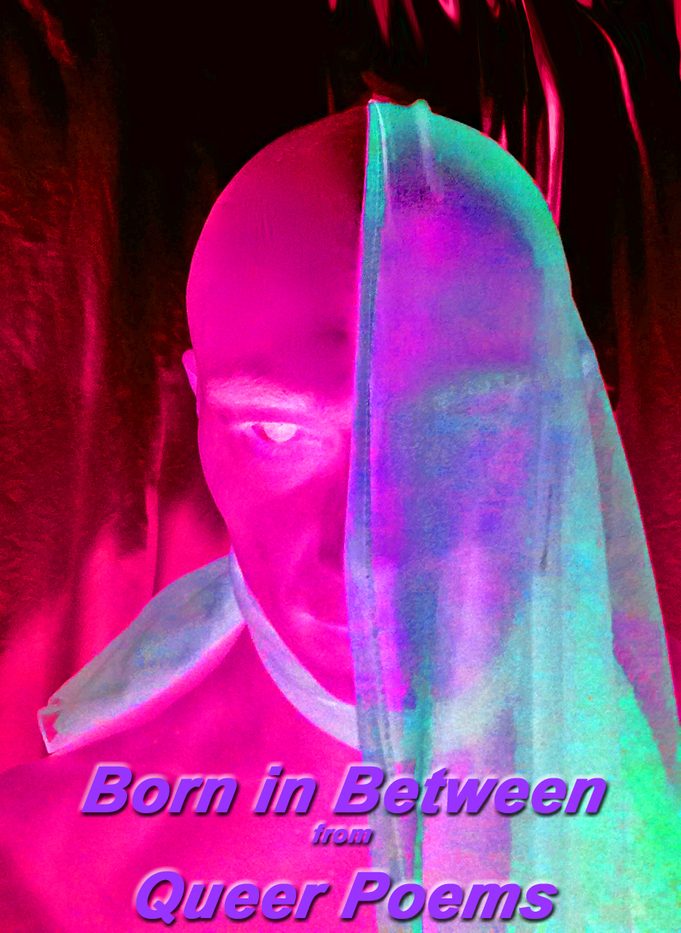
 'Behind the curtains no one cares.'
'Behind the curtains no one cares.'Performing 'Shadow Whisper' from Queer Poems at the Poetry Society, Covent Garden, London.
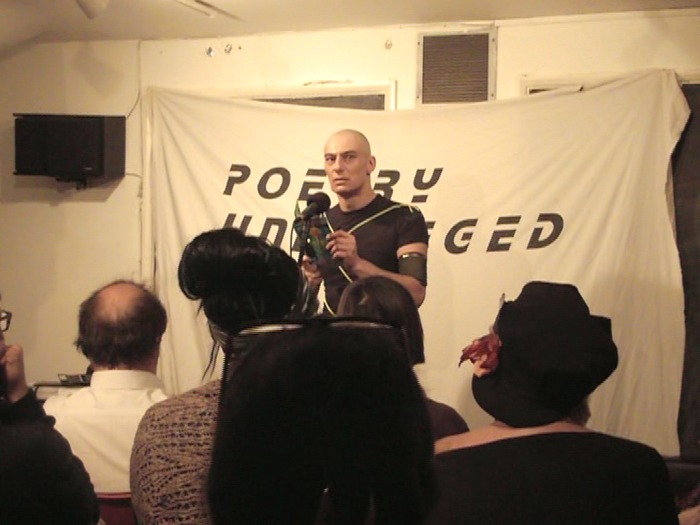
 I'd like to thank Christina for the video of my live performance of 'Shadow Whisper' from Queer Poems at the Poetry Society in Covent Garden, London:
I'd like to thank Christina for the video of my live performance of 'Shadow Whisper' from Queer Poems at the Poetry Society in Covent Garden, London:'Shadow Whisper' Live Video >>
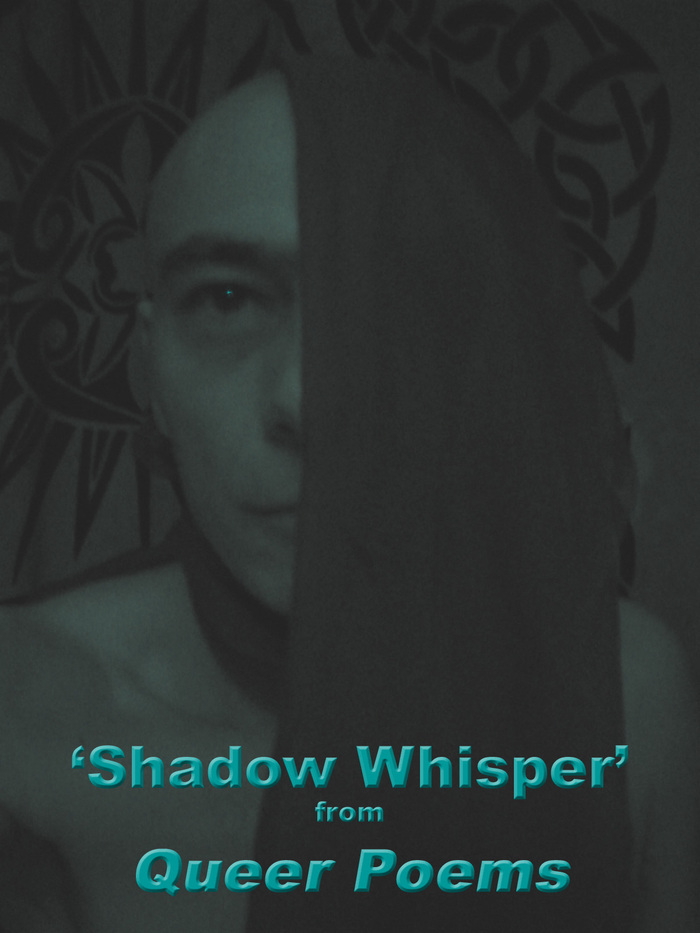
 '... raw emotions expressed through art...'
'... raw emotions expressed through art...'
My favourite line from this review of Queer Poems that appeared today on Amazon UK.
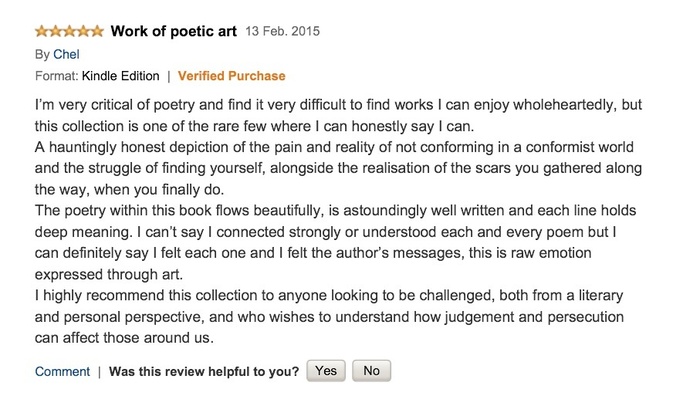
 Like every month throughout this year, Kind Over Matter is featuring a poem from Queer Poems. This month's poem is 'Lament to Lust', a short poem celebrating the beauty of LGBT love, but with a final twist that refers to the horror of its prosecution.
Like every month throughout this year, Kind Over Matter is featuring a poem from Queer Poems. This month's poem is 'Lament to Lust', a short poem celebrating the beauty of LGBT love, but with a final twist that refers to the horror of its prosecution.Click on the picture to read 'Lament to Lust' on Kind Over Matter
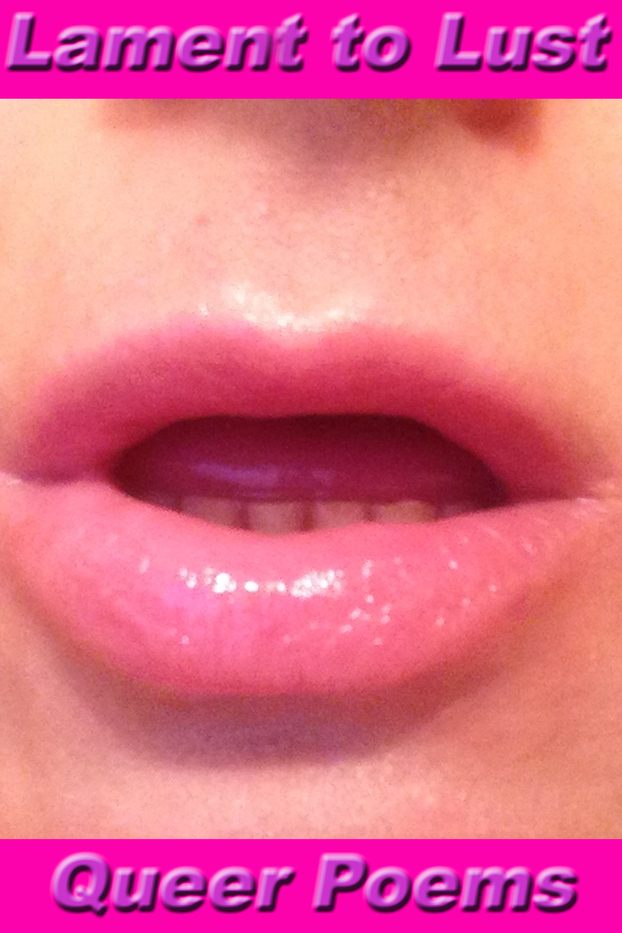
 The "beauty" of LGBT love? What's so beautiful about one guy sticking his dick in another guy's ass? No, gay love is anything BUT beautiful -- it's ugly, it's unnatural, it's ungodly, it's emasculating, and it's the best method of spreading venereal disease!
The "beauty" of LGBT love? What's so beautiful about one guy sticking his dick in another guy's ass? No, gay love is anything BUT beautiful -- it's ugly, it's unnatural, it's ungodly, it's emasculating, and it's the best method of spreading venereal disease!
 Dennis wrote: "The "beauty" of LGBT love? What's so beautiful about one guy sticking his dick in another guy's ass? No, gay love is anything BUT beautiful -- it's ugly, it's unnatural, it's ungodly, it's emascu..."
Dennis wrote: "The "beauty" of LGBT love? What's so beautiful about one guy sticking his dick in another guy's ass? No, gay love is anything BUT beautiful -- it's ugly, it's unnatural, it's ungodly, it's emascu..."Sonnet XVIII
Shall I compare thee to a summer's day?
Thou art more lovely and more temperate:
Rough winds do shake the darling buds of May,
And summer's lease hath all too short a date:
Sometime too hot the eye of heaven shines,
And often is his gold complexion dimmed,
And every fair from fair sometime declines,
By chance, or nature's changing course untrimmed:
But thy eternal summer shall not fade,
Nor lose possession of that fair thou ow'st,
Nor shall death brag thou wander'st in his shade,
When in eternal lines to time thou grow'st,
So long as men can breathe, or eyes can see,
So long lives this, and this gives life to thee.
Shakespeare William
I chose to start my response to you, Dennis, quoting a poem the Bard wrote to celebrate his love for a male member of his theatre company. This is to bring just one of the myriad examples of Literature that celebrates LGBT love, and unless you want to get rid of some of the biggest names in Literature, from Homer to Sappho to Woolf, Virginia to E M Forster and Oscar Wilde, Rimbaud Arthur... the list goes on, from a literary point of view, your response, if you wish to be consistent, would request you not to write Poetry, not to use the stream of consciousness, etc...
From a scientific point if view, as you point out that it is 'unnatural', I will keep it simple and ask you to read any of the thousands of studies that show animals engage in homosexual behaviour: http://en.m.wikipedia.org/wiki/Homose... to keep it simple...
What is more, if you wish to use a computer to communicate to me, still sticking to a scientific argument, well, then you shouldn't, as this 'ugly love' was the love practised by Alan Turing, the inventor of the computer (by the way, Leonardo Da Vinci was gay, as were Michelangelo, Caravaggio, Plato...) So, please refrain from admiring any of the achievements of Greek Philosophy, of the Remaissance etc.
Where I really object though, is in your use of the word 'ungodly':
Queer Poems closes with a funny poem, as all my collections do, but the one before it, the 'resolution' of the colection before the final laugh, 'In Fear of Self', more than a pun of, a defintition of the meaning of the word 'homophobia', and by many a reader regarded as the best poem in the collection (it's the longest too) closes with these two lines:
In your own likeness to find fear
While in God's words our love is clear.
Now, why did I mention this at the very end? You of course come from a 'religious' perspective. So let me ask you, where in the Holy Bible is written that homosexual live is 'ugly', as you say? Oddly enough, not until 1611 (yep) when a translation of the Bible, the Authorised Version appeared. That version, though taken as a standard version in many a country, is not recognised as 'the Bible' by the Catholic Church and by Jews and Muslims. Although I do not read Hebrew, I do Latin, and the official Bible for the Catholic Church, the Vulgata, does not say what you read in translations, nor am I told does the Hebrew Bible. Thus, the words were added by one of the 'companies', as they were called by King James, who translated the Bible into the 'Authorised Version' (oddly
enough, there had been translations before that, including the Queen Elizabeth's version, admittedly regarded as a bad translation too, but there, no memtion of the ugliness of homosexual love). Thus, you can bring as many translators' words as you want as the basis of your argument, but unfortunately, those don't seem to be the original words pf God in the Bible.
Next, you use the word 'ugly', and I will here refer you to a Gospel, the most philosophical of all the Gospels, St John's:
'In principio erat verbum et verbum erat apud Deo...'
I'll give you as close a translation (mine) as possible:
'At the beginning/ at the origin was the word/the thought, and the thought / word was with God.'
The meaning is far-reaching, though it clearly says that it is weith words that we Humans have a 'godlike' quality, speaking metaphorically, as it is through thoughts and words that we can 'generate' (I am loathe to use the word 'create' for Humans). Corollary: by saying 'ugly' and writing ugly words, you generate ugliness. Studies of the Toras show that we have been given free will as we have been given the choice to either 'know' (in the Biblical sense) good or evil, by using ugly words, one chooses (generates) ugliness, yet that is contrary to our purpose in the world as stated in Genesis...
The last thing (I don't think your comment on venereal disease can deserves any response, just one note, Syphilis was not and is not a 'gay venereal disease' and has decimated Humans for centuries) leads me back to both a pattern I have noticed and a motto of mine: Pornography is in the eye of the beholder. This, I take up in the introduction to Queer Poems, where I state, 'If beauty is in the eye of the beholder, then we know where to find ugliness too,' and the pattern of all those who criticse the book on ideological grounds to see sex in the book, and distort words. How funny that you have to mention a phallus etc, while I clearly stated 'love'. The same attitude has happened in other posts on the book. And one wonders who is (to use words in the way you would use, as of course, I don't believe for a second that sex is perverted) the pervert?
If I were to psychoanalyse your response (just basic Freud, nothing advanced), I would have spot a form of voyeuristic obsession in your translation of the word 'love' into a graphic sexual act, which you condemn, yet comtemplate on in detail and with some gusto, one would think...
By the way, just an idea, but have you ever thought that Genesis 22, where God stops Abraham from sacrificing Isaac, may be read as a teaching to Humankind not to victimise other Humans?
I do refer to that in the very poem 'Lament to Lust' in the closing couplet:
'In search of unison and slain
Like lambs on altars to be slain.'
Which I personally (though readers are free to interpret poems as they wish) read as, while we are seeking harmony, others make of us sacrificial victims to their own prejudice.
 Adriano wrote: "Dennis wrote: "The "beauty" of LGBT love? What's so beautiful about one guy sticking his dick in another guy's ass? No, gay love is anything BUT beautiful -- it's ugly, it's unnatural, it's ungod..."
Adriano wrote: "Dennis wrote: "The "beauty" of LGBT love? What's so beautiful about one guy sticking his dick in another guy's ass? No, gay love is anything BUT beautiful -- it's ugly, it's unnatural, it's ungod..."Adriano,
Having read your entire post, I felt the need to compliment you on both your personal knowledge of history, religion, the classics, and social sciences, and quite effectively expressing it in writing. Good job!
For the record, I am straight. My late wife, Elaine, and I remained together for 35 1/2 wonderful years and had five children. She was and remains the one true love of my life. That said; my acquaintances, friends, and relatives include straight men and women, gay men and lesbians, men and women of color, and caucasions. Each is unique and has earned my respect, admiration, and occasionally, my anger and contempt.
A bit of advice: Before becoming upset by someone's comments, consider the source. More often than not, you will save yourself a lot of aggravation.
 Jim wrote: "Adriano wrote: "Dennis wrote: "The "beauty" of LGBT love? What's so beautiful about one guy sticking his dick in another guy's ass? No, gay love is anything BUT beautiful -- it's ugly, it's unnat..."
Jim wrote: "Adriano wrote: "Dennis wrote: "The "beauty" of LGBT love? What's so beautiful about one guy sticking his dick in another guy's ass? No, gay love is anything BUT beautiful -- it's ugly, it's unnat..."Thanks, Jim, I really do appreciate it.
Your social circle is an example of the society I'd love to see everywhere.
I know what you mean, but I had to respond, I fell into temptation...
 Adriano wrote: "From a scientific point if view, as you point out that it is 'unnatural', I will keep it simple and ask you to read any of the thousands of studies that show animals engage in homosexual behaviour: http://en.m.wikipedia.org/wiki/Homose... to keep it simple..."
Adriano wrote: "From a scientific point if view, as you point out that it is 'unnatural', I will keep it simple and ask you to read any of the thousands of studies that show animals engage in homosexual behaviour: http://en.m.wikipedia.org/wiki/Homose... to keep it simple..."I have friends who are gay and I certainly am not hostile toward homosexuals, but I do take exception to these "studies," because they are flawed. Every single one that I have looked at have either been funded by groups with a homosexual agenda, (which is cause for suspicion at least), and/or ignore the reality of what they are seeing.
There is not homosexuality in other species. There is hyper-sexuality. Those studies look at whether animals, when left alone with members of the same gender, will engage in sexual behavior. What they do not look at is, when given a choice, those animals ALWAYS prefer the opposite gender. They cannot control their temptation, so they will go after any other animal (even the ugly ones ;-) ), but prefer the opposite gender.
This is the same reason why twisted perverts who engage in bestiality are able to get willing animal participants. They are hyper-sexual.
Also, many who follow the Bible would not care if there was homosexuality in the animal kingdom because the Bible does not lump man with animal.
Again, this is not to be negative toward homosexuals. This is actually because of my lack of trust in "science." That same "science" which has proven itself wrong many times and where "scientists" have been caught manipulating their data or hiding contradictory data so their results show what they want them to show.
 I myself have issues with science in many areas, however, although I do onow that yhere has been a claim that animals only engage in homosexual behaviour in the absence of the opposite sex, recent studies have shown that penguins and dolphins do have homosexual relationships while still in their communities (and I suppose dog owners may have noticed this behaviour themselves). Penguins have actually been documented has having stable relationships:
I myself have issues with science in many areas, however, although I do onow that yhere has been a claim that animals only engage in homosexual behaviour in the absence of the opposite sex, recent studies have shown that penguins and dolphins do have homosexual relationships while still in their communities (and I suppose dog owners may have noticed this behaviour themselves). Penguins have actually been documented has having stable relationships:http://www.sciencedirect.com/science/...
I do undertand and praside your scientific rigour, as old studies had focussed on individulas who had no choice, while there have been quite a few studies recently thatshow that even when presented with the option.
I do know many who follow the Bible (including myself, as I am deeply religious, and one could add the current Pope to the list and many before the Counter-Reformation) don't care about whether animals engage i homosexual behaviour. Mine was a response to the precise point raised by Dennis, yet, on second thought, the simpler, philosophical approach of saying that if it happens it cannot be 'unnatural' would have been more direct.
As to scientist manipulating data, we do know many cases of it ('missing links' have been faked for at least a hundred years and always been found to be such, so far), especially, I must say, when it comes to biology, but I think this would lead us on a tangential path.
 In their communities, the strongest males get the females. The rest still have urges. If the dominant males die off, those which were without then step up and they mate with females. I have yet to find a study that proves otherwise.
In their communities, the strongest males get the females. The rest still have urges. If the dominant males die off, those which were without then step up and they mate with females. I have yet to find a study that proves otherwise.As for the Bible, I will leave that one alone.
I did realize that you were answering a point of someone else. I just have a friend who did a lot of research into those studies about homosexuality in the animal kingdom and I looked at his research and then did more of my own. I tend to counter the argument of homosexual animals with those findings.
The philosophical approach actually made me laugh. Humans do one hell of a lot of things that are unnatural in many areas of life.
Best wishes
 "It isn't what we know that gives us trouble. It's what we know that ain't so.*
"It isn't what we know that gives us trouble. It's what we know that ain't so.**Will Rogers (Humorist) 1879-1935.
 Jon wrote: "In their communities, the strongest males get the females. The rest still have urges. If the dominant males die off, those which were without then step up and they mate with females. I have yet t..."
Jon wrote: "In their communities, the strongest males get the females. The rest still have urges. If the dominant males die off, those which were without then step up and they mate with females. I have yet t..."Penguins and dolphins do not live in hierarchical societies; they live in 'community-style' societies and do not compete for partners. Still, these studies are quite recent, and one never knows what will come next.
The philosophical argument addresses Dennis's point about homosexual love being 'unnatural'; whether things men do are morally, societally, culturally right or wrong, they still remain by definition natural. In fact, nothing can be unnatural, as it simply would not exist. I know that Dennis might have wanted to say 'wrong' instead of his list of words, but I will stick to his list of words and respond to those. It's simply correvt to counter an argument as it is presented and not as what we may imply the person may want to say; it is safe as well, as one can always reply, 'That is not what I said.' Dennis used a lot of words, but didn't say wrong.
Amongst my hobby horses there is also a fight against double-speak and the shifting of meanings in words: this has created many a hypocrisy and innumerable misunderstandings in our world, so, I stick to what a word actually means: an asteroid destroyng Earth might be horrible, but it remains natural. I agree that Humankind has caused and still causes a lot of harm, pain, and suffering, and I am the first to say that we have done many, many things wrong in our history, but we yet have not achieved super or metanatural powers. Ofdly enough, assuming ennis starts from a religious point of view, the only one who can do unnatural things is God, as God is super-natural. From a religious/philosophical point of giew, everything that is part of God's creation or exists has by definition to be natural. When we move into culturally acceptable, well, in our history, there were times when sacrificing Humans was acceptable, but we do need to distinguish between 'acceltable' and 'natural' for a very important reason: if we decide that 'natural' means what Human society accepts as 'appropriate', we are saying that Humans are in charge, in control of nature, of the universe. One of my big philosophica convictions is that we may believe the Earth is not at the centre of the universe, yet we still believe that Humans are: we have not moved, in terms of our consciousness, very far from Pre-Copernican times, and in this, I believe it is high time we took ourselves down a peg or two and accepted that we are not in charge of nature, but, sorry if I go back to the Bible, metaphorical 'gardeners', not 'owners'.
Our job is to nurture nature, not to decide what nature should or should not do. The rules we apply to ourselves as a society are, and should remain, defined by our own name, thus 'humane' and 'inhumane'.
 Jim wrote: ""It isn't what we know that gives us trouble. It's what we know that ain't so.*
Jim wrote: ""It isn't what we know that gives us trouble. It's what we know that ain't so.**Will Rogers (Humorist) 1879-1935."
I love it; I love everything that questions our understanding, and this quotation must be up there with the famous words of Socrates.
 Adriano wrote: "In fact, nothing can be unnatural, as it simply would not exist."
Adriano wrote: "In fact, nothing can be unnatural, as it simply would not exist."You and I will have to agree to disagree on this point. Your definition of natural does not match any definition outside of philosophy that I have ever read. I consider the philosophical idea of natural to be ridiculous.
Books mentioned in this topic
Queer Poems (other topics)Queer Poems (other topics)
Queer Poems (other topics)
Queer Poems (other topics)
Queer Poems (other topics)
More...
Authors mentioned in this topic
Dante Alighieri (other topics)Samuel Taylor Coleridge (other topics)
John Keats (other topics)
Catullus (other topics)
Vanessa Bell (other topics)
More...



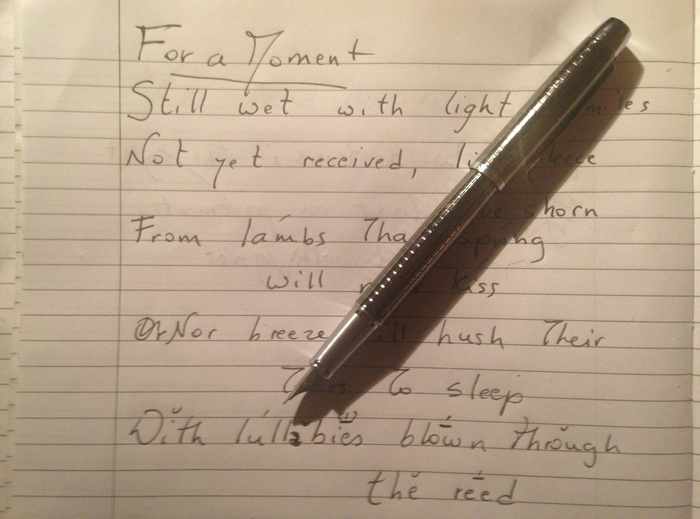
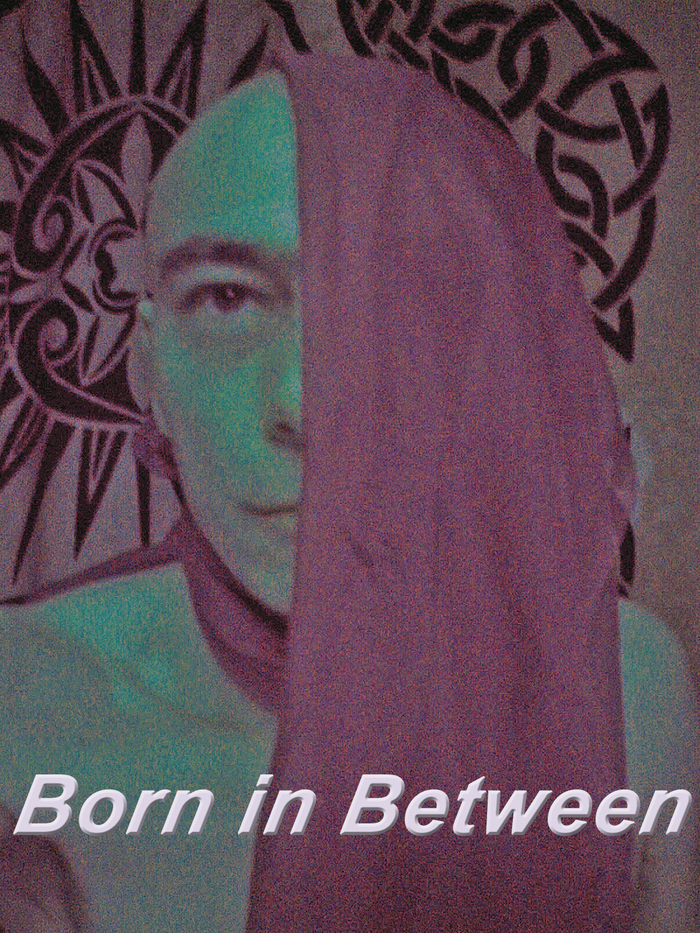
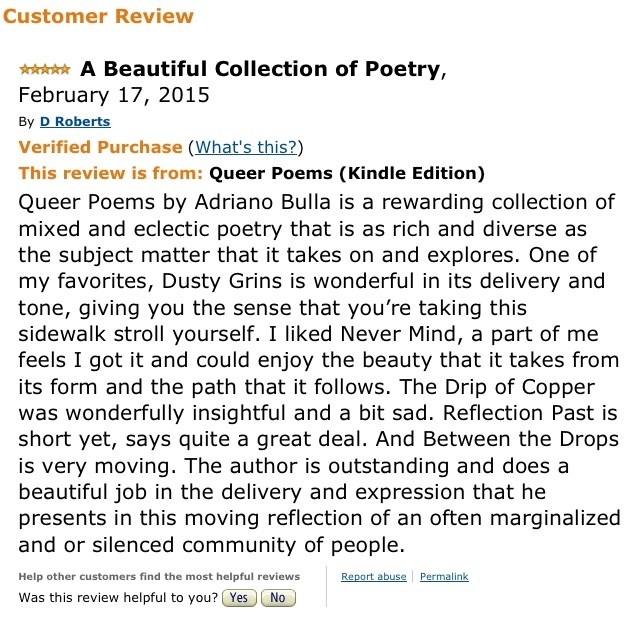


Queer Poems will be FREE on Amazon from Monday 25th January to Wednesday 27th January 2016 hrere>>>
Queer Poems, by the author of the novel The Road to London and of the poetry collection Ybo' and Other Lies, is a collection of poems about 'queer' people, feelings and situations. Continuing Adriano Bulla's exploration of the soul of the downtrodden, the disenfranchised, the sufferers of this world, Queer Poems, often dark and intense, includes texts about LGBT issues, androgyny, polygamy, domestic violence, rape, homelessness, and more.
Intense imagery and hinted rhymes play with the rhythm and structure of the poems, by the author himself described as 'following the way T.S. Eliot's 'Preludes' opened'.
Out in/by November 2014
Shadow Whisper
Behind the bleeding veils of coarse
Corrosive cords of linen stiffened
In the breath that freezes stars
And chokes the Moon in solitary
Nights, the blighted cries of voices
Moist with poisoned spells
Of Hell
Are drawn on charcoaled canvas cut
And torn by time
When echoes shadow sparks
In embers stifled under scars
Like drops of thought that thaw in thick
Black holes devouring dry, deserted
Worlds with wanton words of woes
And stares -
Behind the curtains no one cares.
(A poem on domestic violence inspired by Kamille Freske's painting Shadow Whisper, which will appear in the collection, courtesy of the artist).
View the painting Shadow Whisper>>